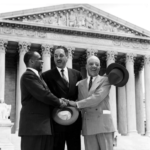UCSB study finds similar responses in native-born and immigrantsBy Adam Smith, Sampan Dec 15, 2006 – European Americans are supposed to value the individual; Asian Americans, the group. So one would think that when facing trouble, Asian Americans would be more likely to seek help from their peers than Caucasians. Not so. New research shows the opposite is more likely to be true. Two social psychologists at the University of California at Santa Barbara have found that Asian Americans, especially immigrants from Asia, are actually less likely than their European American counterparts to seek support from their peers during times of stress. “Some people view collectivistic cultures [as] closer, tighter knit, and consequently perhaps that Asian Americans would be more likely to turn to their support network for help. Yet we found repeatedly the opposite, that when it comes to specifically asking for help…the Asian Americans in our study reported they were less likely to turn to their networks for help,” said David K. Sherman, assistant professor of psychology at UC Santa Barbara, in a phone interview. Sherman oversaw the research project with Heejung S. Kim, also an assistant professor of psychology at the university. Sherman and Kim describe so-called collectivistic cultures as those in which “members of close groups are bound to one another emotionally.” These cultures tend to highly value the group’s goals and well-being over the individuals. So-called individualistic cultures, on the other hand, value independence and the individual over the group. The research suggests that Asian Americans fear that asking for help would burden others, disrupt harmony of the group, and bring shame to the person facing trouble or his or her family. Caucasians, however, may view asking for help as a “proactive” way to solve the problematic situation. Asian Americans, said the researchers, are more likely to simply spend time with those to whom they are close instead of directly asking them for help. Yet others, such as European Americans from more “individualistic cultures,” are more likely to ask for help from close friends or family “with less concern for the potential costs that doing so might cause the relationship.” Also, those in individualistic cultures tend to perceive responding to requests for help as a choice, whereas those in collectivistic cultures view responding to such requests as an obligation. This makes people from collectivistic cultures more “cautious” when asking for help. “In a collectivistic culture, generally people have a stronger sense of duty or obligation to help out each other. So…if…someone close were to ask you for help in some way, people will feel that it is their responsibility or obligation to say ‘yes,'” said Kim. Because “it’s highly unlikely the person will say ‘no’… that just means that I have to calibrate and pay attention to whether this is an appropriate thing to ask, or what kind of burden am I going to pose on this person.” But, she said, in “a more individualistic culture everyone more or less has the choice or freedom to say ‘yes’ or ‘no.’ It’s not that people don’t help, it’s that the help usually comes from a voluntary choice.” The researchers said that immigrants were more likely to avoid seeking help, but that Asian Americans born in the U.S. were also likely to act similarly. “We have looked at this across different generations of Asian Americans. What we find is that the effects are strongest for the Asian immigrants,” said Sherman. “That suggests strongly that it’s kind of driven by how acculturated you are. If you are a latter-generation Asian American who is more bicultural, you’re less likely to show these effects.” Sherman and Kim say their research may explain why Asian Americans may avoid asking for help during times of stress and why they may not take advantage of available social services. It may also be used to design social service programs that more effectively reach Asian Americans. The research was published in the December issue of Personality and Social Psychology Bulletin, the journal of the “Society for Personality and Social Psychology.” A grant from the National Science Foundation’s Human and Social Dynamics program funded the project, which was also carried out by Shelley E. Taylor, professor of psychology, and Deborah Ko, a social psychology graduate student at UC Santa Barbara.
Other Readings of Interest
|
||
|











